Unio Specialty Care urologists are skilled in a variety of surgical techniques including Open and Radical Prostatectomy.
Surgery’s primary benefit is the elimination of the cancer. Open Prostatectomy is surgery to remove all or part of the prostate by making an incision in the patient’s lower abdomen or perineum. Open prostatectomy can be either a partial or radical procedure. Radical prostatectomy is surgery to remove the entire prostate gland along with nearby tissues such as the seminal vesicles. Your Unio Specialty Care Urologists can help you determine the best alternative for your condition depending on the extent of your cancer. The major advantage of total prostate removal – in cases where the cancer is localized to the prostate, then removal of the prostate will cure the cancer! If the cancer is not localized to the prostate, which means it has spread; removal of the prostate will not cure the cancer and additional therapy may be required.
Prostatectomy comes with its potential side effects that need to be thoroughly discussed with your Unio Specialty Care Urologist. Between 2-4% of men undergoing prostatectomy will have permanent problems with urinary control. Nerve damage leading to impotence can be an issue. The nerves that stimulate erections run adjacent to the prostate on their way to the penis. If all of these nerves are removed during total prostatectomy, impotence (inability to achieve an adequate erection) will result. In certain circumstances, some of the nerves that create erections can be spared with a success rate between 40-70%. Not every male is a good candidate for nerve sparing because of the extent of disease.
There are a wide variety of post-surgical options for patients who develop impotence, and even those whose erections were not adequate before the surgery. Treatment of impotence in post-prostate surgery includes vacuum pumps, medications and placement of prostheses — all work well in selected patients.

